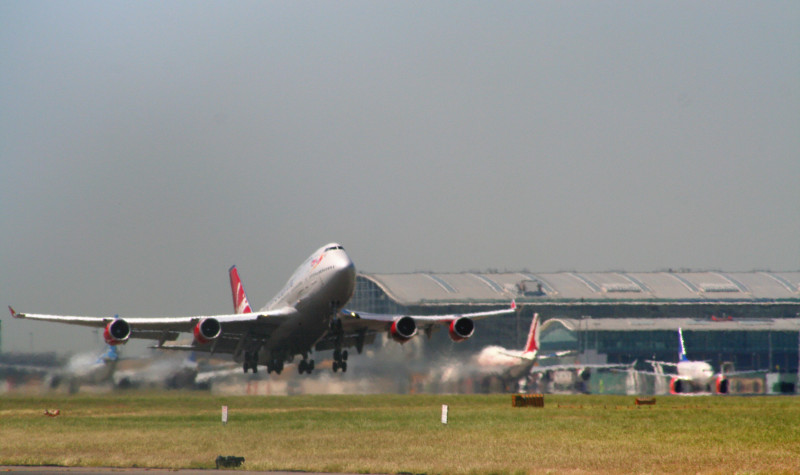Airport Wars: Indeterminate Delay

Back in September I wrote a piece for these pages (Airport Wars: Heathrow versus Gatwick) in which I explained why a third runway at Heathrow is the best outcome for the British economy but that this decision is politically fraught.
I am not going to recycle the contents of that piece here but, in a nutshell, Heathrow is a global hub airport while Gatwick is very largely a point-to-point airport. However, the third runway at Heathrow involves demolishing the entire village of Harmondsworth (including its Norman church) and would potentially increase aircraft noise and environmental pollution over a large area of West London. While, in contrast, a second runway at Gatwick could be built on farmland, and the environmental consequences would not be so dire (or so it is claimed).
During the autumn it looked as if the Heathrow argument was winning ground in Whitehall, with George Osborne apparently on-side. As recently as last week, rumours were circulating that the decision was imminent. Then, as this week progressed, the news was trailed that there would be a delay. And now we have it: a decision not to decide. The CBI is not the only interest group that is appalled that, after decades of deliberation, expensive reports and endless consultations, the British Government is paralysed with indecision.
This morning, on the Radio 4 Today programme, the Transport Secretary, Patrick McLoughlin, revealed that a decision would “probably” be made next summer and that the Gatwick option was still in play. So we are back where we started.
Political developments have overtaken events since Sir Howard Davies delivered the Airports Commission Report on 01 July this year. (That was the one that reckoned that a third runway at Heathrow would add £131 billion to our GDP).
Most importantly, Zac Goldsmith was selected in October as the Tory Party’s candidate to replace Boris Johnson in the London mayoral election to be held in May 2016. Mr Goldsmith has built a career on a rabidly anti-Heathrow ticket: his well-healed Richmond constituents are averse to aeroplane noise. His green sympathies are no doubt sincere. But his histrionic promise to resign his seat and fight a by-election if the Heathrow option was chosen would have caused embarrassment to Mr Cameron’s government.
If Mr Goldsmith is elected as Mayor of London next May, then he would probably want to resign his seat anyway. At the moment, however, the opinion polls seem to favour Sadiq Khan, the Labour mayoral candidate. Of course, there is all to play for, though the odds have to be in Mr Khan’s favour as London has a strong built-in Labour majority. Mr Khan, by the way, is a Gatwick man.
You might argue that, given that not a single civil aviation runway has been constructed in the South East of England in Mr Cameron’s lifetime, another six months will not make much difference. But the signal that this non-decision gives out concerning UK PLC is very negative. Willie Walsh, CEO of AIG (the Group that controls British Airways, Iberia and Aer Lingus) is already talking about routing some connections through Dublin and Madrid in preference to Heathrow. We shall soon see if that threat is empty – or not. Meanwhile the bosses at Air France-KLM (whose hubs are Paris Charles de Gaulle and Amsterdam Schiphol) must be rubbing their hands with satisfaction.
The real opposition to a Cameron-Osborne axis in favour of Heathrow was surely not Mr Goldsmith, still less Mr Johnson (who has spent the last 24 hours on the airwaves parroting the phrase that the Heathrow option is unworkable) but lies in cabinet. Three cabinet ministers, namely Justine Greening (International Development), Philip Hammond (Foreign Secretary) and Greg Hands (Chief Secretary to the Treasury) represent constituencies on the Heathrow flightpath, and are known to vehemently oppose the Heathrow option. As the Daily Telegraph writes today, there must have been threats of resignation.
Let’s recall that Mr Cameron was thought to be in a strong position. He won an overall majority in the House of Commons seven months ago which allowed him to jettison his Lib-Dem coalition partners and which supposedly enhanced his authority. He faces an Opposition Labour Party which is in a state of civil war. (Indeed the chance that it will split into Social Democratic and Socialist True-Believer factions is significant). And the economy – for now – is in a sweet spot.
And yet he can’t drive a new runway through cabinet (so to speak).
If he can’t even do that at this point, what chance is there that he will get unanimous cabinet approval for his EU renegotiation package? And get all those Eurosceptics (Mr Duncan-Smith, Mrs May, Mr Hammond et al) to sign up to the IN campaign?
I sense trouble ahead.
Comments (0)